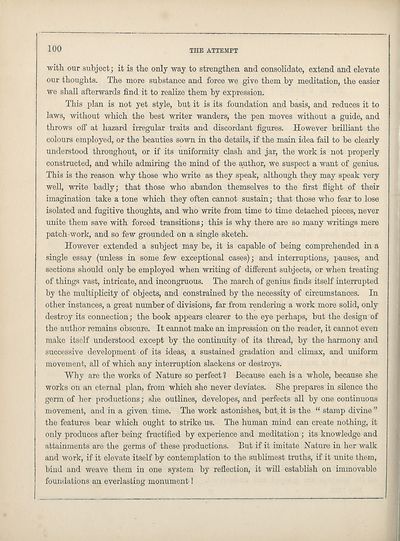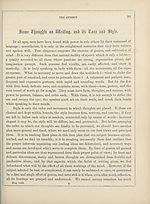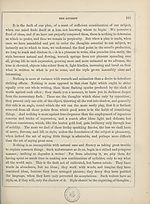Attempt > Volume 1 and Select writings
(112) Page 100
Download files
Complete book:
Individual page:
Thumbnail gallery: Grid view | List view

100
THE ATTEMPT
with our subject; it is the only way to strengthen and consolidate, extend and elevate
our thoughts. The more substance and force we give them by meditation, the easier
we shall afterwards find it to realize them by expression.
This plan is not yet style, but it is its foundation and basis, and reduces it to
laws, without which the best writer wanders, the pen moves without a guide, and
throws olf at hazard irregular traits and discordant figures. However brilliant the
colours employed, or the beauties sown in the details, if the main idea fail to be clearly
understood throughout, or if its uniformity clash and jar, the work is not properly
constructed, and while admiring the mind of the anther, we suspect a want of genius.
This is the reason why those who write as they speak, although they may speak very
well, write badly; that those who abandon themselves to the first flight of their
imagination take a tone which they often cannot sustain; that those who fear to lose
isolated and fugitive thoughts, and who write from time to time detached pieces, never
unite them save with forced transitions; this is why there are so many writings mere
patch work, and so few grounded on a single sketch.
However extended a subject may be, it is capable of being comprehended in a
single essay (unless in some few exceptional cases); and interruptions, pauses, and
sections should only be employed when writing of different subjects, or when treating
of things vast, intricate, and incongruous. The march of genius finds itself interrupted
by the multiplicity of objects, and constrained by the necessity of circumstances. In
other instances, a great number of divisions, far from rendering a work more solid, only
destroy its connection; the book appears clearer to the eye perhaps, but the design of
the author remains obscure. It cannot make an impression on the reader, it cannot even
make itself understood except by the continuity of its thread, by the harmony and
successive development of its ideas, a sustained gradation and climax, and uniform
movement, all of which any interruption slackens or destroys.
Why are the works of Nature so perfect ? Because each is a whole, because she
works on an eternal plan, from which she never deviates. She prepares in silence the
germ of her productions; she outlines, developes, and perfects all by one continuous
movement, and in a given time. The work astonishes, but.it is the “ stamp divine”
the features bear which ought to strike us. The human mind can create nothing, it
only produces after being fructified by experience and meditation; its knowledge and
attainments are the germs of these productions. But if it imitate Nature in her walk
and work, if it elevate itself by contemplation to the sublimest truths, if it unite them,
bind and weave them in one system by reflection, it will establish on immovable
foundations an everlasting monument!
THE ATTEMPT
with our subject; it is the only way to strengthen and consolidate, extend and elevate
our thoughts. The more substance and force we give them by meditation, the easier
we shall afterwards find it to realize them by expression.
This plan is not yet style, but it is its foundation and basis, and reduces it to
laws, without which the best writer wanders, the pen moves without a guide, and
throws olf at hazard irregular traits and discordant figures. However brilliant the
colours employed, or the beauties sown in the details, if the main idea fail to be clearly
understood throughout, or if its uniformity clash and jar, the work is not properly
constructed, and while admiring the mind of the anther, we suspect a want of genius.
This is the reason why those who write as they speak, although they may speak very
well, write badly; that those who abandon themselves to the first flight of their
imagination take a tone which they often cannot sustain; that those who fear to lose
isolated and fugitive thoughts, and who write from time to time detached pieces, never
unite them save with forced transitions; this is why there are so many writings mere
patch work, and so few grounded on a single sketch.
However extended a subject may be, it is capable of being comprehended in a
single essay (unless in some few exceptional cases); and interruptions, pauses, and
sections should only be employed when writing of different subjects, or when treating
of things vast, intricate, and incongruous. The march of genius finds itself interrupted
by the multiplicity of objects, and constrained by the necessity of circumstances. In
other instances, a great number of divisions, far from rendering a work more solid, only
destroy its connection; the book appears clearer to the eye perhaps, but the design of
the author remains obscure. It cannot make an impression on the reader, it cannot even
make itself understood except by the continuity of its thread, by the harmony and
successive development of its ideas, a sustained gradation and climax, and uniform
movement, all of which any interruption slackens or destroys.
Why are the works of Nature so perfect ? Because each is a whole, because she
works on an eternal plan, from which she never deviates. She prepares in silence the
germ of her productions; she outlines, developes, and perfects all by one continuous
movement, and in a given time. The work astonishes, but.it is the “ stamp divine”
the features bear which ought to strike us. The human mind can create nothing, it
only produces after being fructified by experience and meditation; its knowledge and
attainments are the germs of these productions. But if it imitate Nature in her walk
and work, if it elevate itself by contemplation to the sublimest truths, if it unite them,
bind and weave them in one system by reflection, it will establish on immovable
foundations an everlasting monument!
Set display mode to: Large image | Transcription
Images and transcriptions on this page, including medium image downloads, may be used under the Creative Commons Attribution 4.0 International Licence unless otherwise stated. ![]()
| Ladies' Edinburgh Debating Society publications > Attempt > Volume 1 and Select writings > (112) Page 100 |
|---|
| Permanent URL | https://digital.nls.uk/109866298 |
|---|
| Attribution and copyright: |
|
|---|

